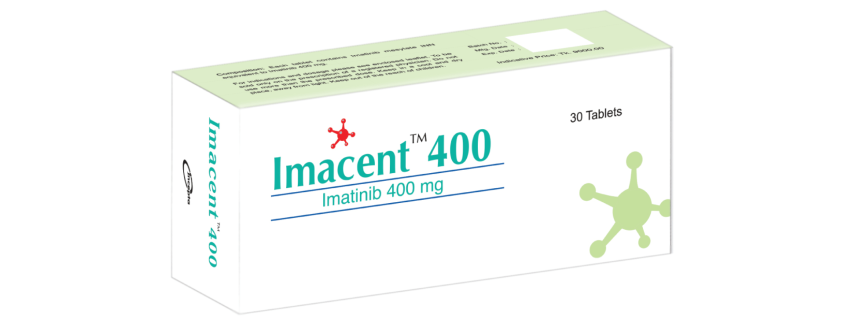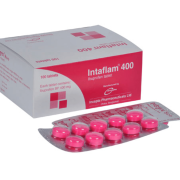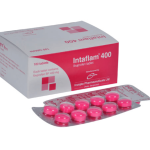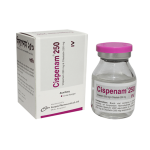Intaflam(Ibuprofen)
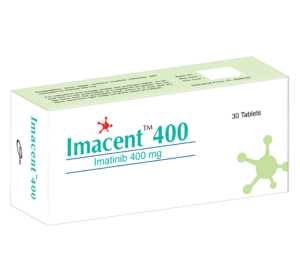
Therapeutic Group: Oncology
Presentation
Imacent 100: Each tablet contains Imatinib Mesylate INN equivalent to Imatinib 100 mg.
Imacent 400: Each tablet contains Imatinib Mesylate INN equivalent to Imatinib 400 mg.
Description
Imatinib mesylate is a protein-tyrosine kinase inhibitor that inhibits the BCR-ABL tyrosine kinase; the constitutive abnormal tyrosine kinase created by the Philadelphia chromosome abnormality in CML. Imatinib inhibits proliferation and induces apoptosis in BCR-ABL positive cell lines as well as fresh leukemic cells from Philadelphia chromosome-positive chronic myeloid leukemia. Imatinib inhibits colony formation in assays using ex vivo peripheral blood and bone marrow samples from CML patients.
In vivo, Imatinib inhibits tumor growth of BCR-ABL transfected murine myeloid cells as well as BCR-ABL positive leukemia lines derived from CML patients in blast crisis. Imatinib is also an inhibitor of the receptor tyrosine kinases for a platelet-derived growth factor (PDGF) and stem cell factor (SCF), c-kit, and inhibits PDGF and SCF mediated cellular events. In vitro, Imatinib inhibits proliferation and induces apoptosis in gastrointestinal stromal tumor (GISTs) cells, which express an activating c-kit mutation.
Indications
Imatinib is indicated for the treatment of:
• Newly diagnosed adult and pediatric patients with Philadelphia chromosome positive chronic myeloid leukemia (Ph+ CML) in chronic phase. Patients with Philadelphia chromosome positive chronic myeloid leukemia (Ph+ CML) in blast crisis (BC), accelerated phase (AP), or in chronic phase (CP) after failure of interferon-alpha therapy
• Adult patients with relapsed or refractory Philadelphia chromosome positive acute lymphoblastic leukemia (Ph+ ALL). Pediatric patients with newly diagnosed Philadelphia chromosome positive acute lymphoblastic leukemia (Ph+ ALL) in combination with chemotherapy
• Adult patients with myelodysplastic/myeloproliferative diseases (MDS/MPD) associated with PDGFR (platelet-derived growth factor receptor) gene re-arrangements as determined with an FDA-approved test
• Adult patients with aggressive systemic mastocytosis (ASM) without the D816V c-Kit mutation as determined with an FDA-approved test or with c-Kit mutational status unknown
• Adult patients with hypereosinophilic syndrome (HES) and/or chronic eosinophilic leukemia (CEL) who have the FIP1L1-PDGFRα fusion kinase (mutational analysis or FISH demonstration of CHIC2 allele deletion) and for patients with HES and/or CEL who are FIP1L1-PDGFRα fusion kinase negative or unknown.
• Adult patients with unresectable, recurrent and/or metastatic dermatofibrosarcoma protuberans (DFSP)
• Patients with Kit (CD117) positive unresectable and/or metastatic malignant gastrointestinal stromal tumors (GIST)
• Adjuvant treatment of adult patients following resection of Kit (CD117) positive GIST
Dosage & Administration
The recommended dose for Imatinib are-
– Adults with Ph+ CML CP: 400 mg/day
– Adults with Ph+ CML AP or BC: 600 mg/day
– Pediatrics with Ph+ CML CP: 340 mg/m2/day
– Adults with Ph+ ALL: 600 mg/day
– Pediatrics with Ph+ ALL: 340 mg/m2/day
– Adults with MDS/MPD: 400 mg/day
– Adults with ASM: 100 mg/day or 400 mg/day
– Adults with HES/CEL: 100 mg/day or 400 mg/day
– Adults with DFSP: 800 mg/day
– Adults with metastatic and/or unresectable GIST: 400 mg/day
– Adjuvant tratment of adults with GIST: 400 mg/day
– Patients with mild to moderate hepatic impairment: 400 mg/day
– Patients with severe hepatic impairment: 300 mg/day
Side Effects
The most frequently reported adverse reactions (greater than or equal to 30%) were edema, nausea, vomiting, muscle cramps, musculoskeletal pain, diarrhea, rash, fatigue and abdominal pain.
Precautions
– Edema and severe fluid retention have occurred. Weigh patients regularly and manage unexpected rapid weight gain by drug interruption and diuretics.
– Cytopenias, particularly anemia, neutropenia, and thrombocytopenia, have occurred. Manage with dose reduction, dose interruption, or discontinuation of treatment. Perform complete blood counts weekly for the first month, biweekly for the second month, and periodically thereafter.
– Severe congestive heart failure and left ventricular dysfunction have been reported, particularly in patients with comorbidities and risk factors. Monitor and treat patients with cardiac disease or risk factors for cardiac failure.
– Severe hepatotoxicity including fatalities may occur
-Assess liver function before initiation of treatment and monthly thereafter or as clinically indicated.
-Monitor liver function when combined with chemotherapy known to be associated with liver dysfunction.
– Grade 3/4 hemorrhage has been reported in clinical studies in patients with newly diagnosed CML and with GIST. GI tumor sites may be the source of GI bleeds in GIST.
– Gastrointestinal perforations, some fatal, have been reported.
– Cardiogenic shock/left ventricular dysfunction has been associated with the initiation of Imatinib in patients with conditions associated with high eosinophil levels (e.g., HES, MDS/MPD and ASM).
– Bullous dermatologic reactions (e.g., erythema multiforme and Stevens-Johnson syndrome) have been reported with the use of Imatinib.
– Hypothyroidism has been reported in thyroidectomy patients undergoing levothyroxine replacement.
– Closely monitor TSH levels in such patients.
– Fetal harm can occur when administered to a pregnant woman. Apprise women of the potential harm to the fetus, and to avoid pregnancy when taking Imatinib.
– Growth retardation occurring in children and preadolescents receiving Imatinib has been reported.
– Close monitoring of growth in children under Imatinib treatment is recommended.
– Tumor lysis syndrome. Close monitoring is recommended.
– Reports of motor vehicle accidents have been received in patients receiving Imatinib. Caution patients about driving a car or operating machinery.
– Renal toxicity. A decline in renal function may occur in patients receiving Imatinib. Evaluate the renal function at baseline and during therapy, with attention to risk factors for renal dysfunction.
Use in Pregnancy & Lactation
Imatinib can cause fetal harm when administered to a pregnant woman based on human and animal data. There are no clinical studies regarding use of Imatinib in pregnant women. There have been postmarket reports of spontaneous abortions and congenital anomalies from women who have been exposed to Imatinib during pregnancy. Reproductive studies in rats have demonstrated that Imatinib mesylate induced teratogenicity and increased incidence of congenital abnormalities following exposure to Imatinib mesylate at doses equal to the highest recommended human dose of 800 mg/day based on body surface area. Women should be advised to avoid pregnancy when taking Imatinib. If this drug is used during pregnancy, or if the patient becomes pregnant while taking this drug, the patient should be apprised of the potential hazard to the fetus. The background risk of major birth defects and miscarriage for the indicated population is not known.
However, in the U.S. general population, the estimated background risk of major birth defects of clinically recognized pregnancies is 2-4% and of miscarriage is 15%-20%. Imatinib and its active metabolite are excreted into human milk. Because of the potential for serious adverse reactions in breastfed infants from Imatinib, advise a lactating woman not to breastfeed during treatment and for 1 month after the last dose.
Pediatric Use
The safety and effectiveness of Imatinib have been demonstrated in pediatric patients with newly diagnosed Ph+ chronic phase CML and Ph+ ALL. There are no data in children under 1 year of age.
Geriatric Use
In the CML clinical studies, approximately 20% of patients were older than 65 years. In the study of patients with newly diagnosed CML, 6% of patients were older than 65 years. The frequency of edema was higher in patients older than 65 years as compared to younger patients; no other difference in the safety profile was observed. The efficacy of Imatinib was similar in older and younger patients.
Hepatic Impairment
The effect of hepatic impairment on the pharmacokinetics of both Imatinib and its major metabolite, CGP74588, was assessed in 84 patients with cancer with varying degrees of hepatic impairment at Imatinib doses ranging from 100 mg to 800 mg. Mild and moderate hepatic impairment do not influence exposure to Imatinib and CGP74588. In patients with severe hepatic impairment, the Imatinib Cmax and area under curve (AUC) increased by 63% and 45% and the CGP74588 Cmax and AUC increased by 56% and 55%, relative to patients with normal hepatic function. Reduce the dose by 25% for patients with severe hepatic impairment.
Renal Impairment:
The effect of renal impairment on the pharmacokinetics of Imatinib was assessed in 59 patients with cancer and varying degrees of renal impairment at single and steady state Imatinib doses ranging from 100 to 800 mg/day. The mean exposure to Imatinib (dose-normalized AUC) in patients with mild and moderate renal impairment increased 1.5- to 2-fold compared to patients with normal renal function. There are not sufficient data in patients with severe renal impairment. Dose reductions are necessary for patients with moderate and severe renal impairment.
Drug Interaction
CYP3A4 inducers may decrease Imatinib Cmax and area under the curve (AUC) CYP3A4 inhibitors may increase Imatinib Cmax and AUC. Imatinib is an inhibitor of CYP3A4 and CYP2D6 which may increase the Cmax and AUC of other drugs. Patients who require anticoagulation should receive low-molecular-weight or standard heparin and
not warfarin.
Storage
Do not store above 30°C.
Commercial Pack
Imacent 100: Each box contains 3 blister of 10 tablets.
Imacent 400: Each box contains 3 blister of 10 tablets.

